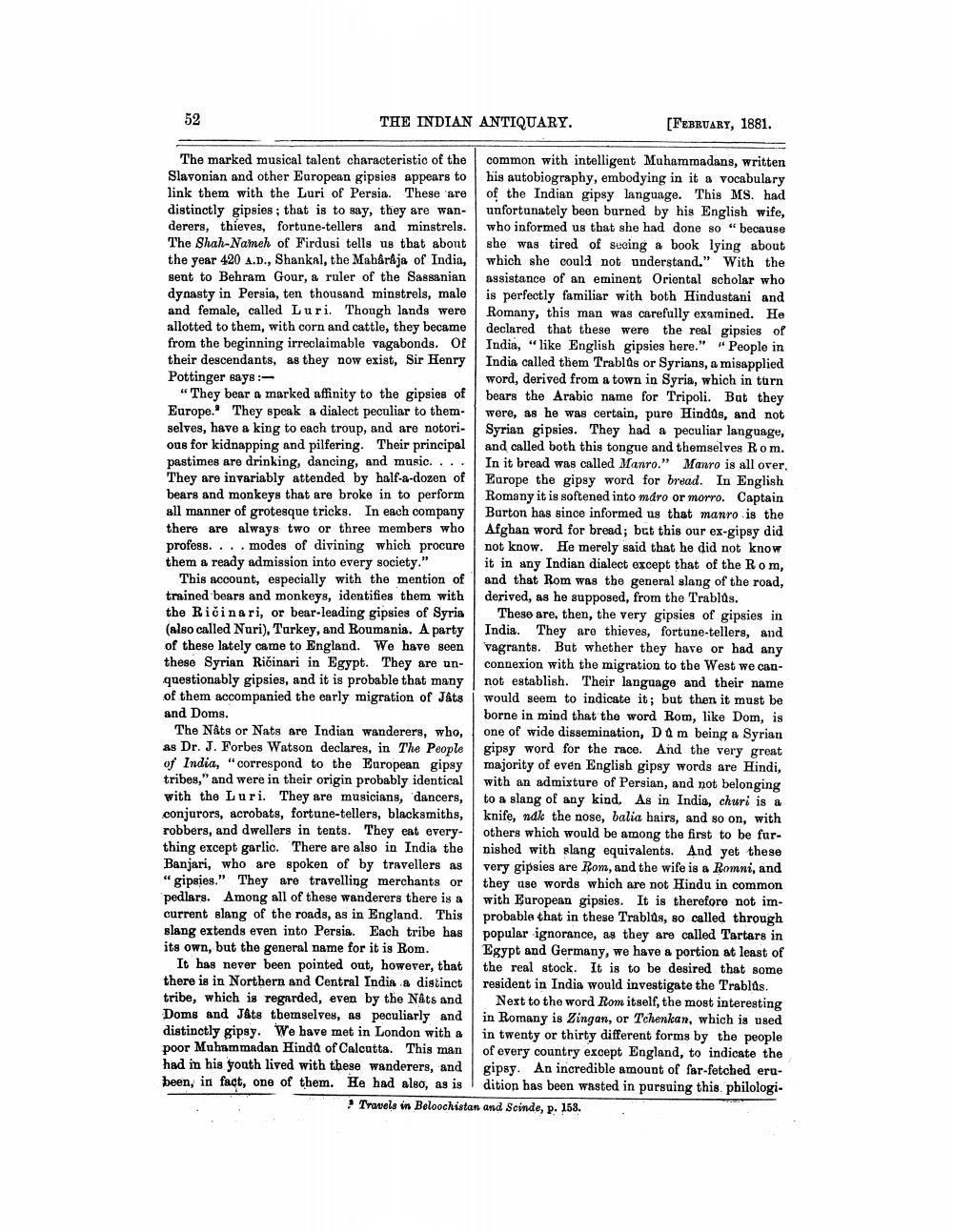________________
52
THE INDIAN ANTIQUARY.
[FEBRUARY, 1881.
The marked musical talent characteristic of the common with intelligent Muhammadans, written Slavonian and other European gipsies appears to his autobiography, embodying in it a vocabulary link them with the Luri of Persia. These are of the Indian gipsy language. This MS. had distinctly gipsies; that is to say, they are wan- unfortunately been burned by his English wife, derers, thieves, fortune-tellers and minstrels. who informed us that she had done so " because The Shah-Nameh of Firdusi tells us that about she was tired of seeing a book lying about the year 420 A.D., Shankal, the Maharaja of India, which she could not understand." With the sent to Behram Gour, & ruler of the Sassanian assistance of an eminent Oriental scholar who dynasty in Persia, ten thousand minstrels, male is perfectly familiar with both Hindustani and and female, called Luri. Though lands were Romany, this man was carefully examined. He allotted to them, with corn and cattle, they became declared that these were the real gipsies of from the beginning irreclaimable vagabonds. Of India, "like English gipsies here." "People in their descendants, as they now exist, Sir Henry India called them Trablus or Syrians, a misapplied Pottinger says :
word, derived from a town in Syria, which in turn "They bear a marked affinity to the gipsies of bears the Arabic name for Tripoli. But they Europe. They speak a dialect peculiar to them- were, as he was certain, pure Hinds, and not selves, have a king to each troup, and are notori- Syrian gipsies. They had a peculiar language, ous for kidnapping and pilfering. Their principal and called both this tongue and themselves Rom. pastimes are drinking, dancing, and music. ... In it bread was called Manro." Manro is all over They are invariably attended by half-a-dozen of Europe the gipsy word for bread. In English bears and monkeys that are broke in to perform Romany it is softened into maro or morro. Captain all manner of grotesque tricks. In each company Burton has since informed us that manro is the there are always two or three members who Afghan word for bread; but this our ex-gipsy did profess. ... modes of divining which procure not know. He merely said that he did not know them a ready admission into every society." it in any Indian dialect except that of the Rom,
This account, especially with the mention of and that Rom was the general slang of the road, trained bears and monkeys, identifies them with derived, as he supposed, from the Trablus. the Rioinari, or bear-leading gipsies of Syria These are, then, the very gipsies of gipsies in (also called Nuri), Turkey, and Roumania. A party India. They are thieves, fortune-tellers, and of these lately came to England. We have seen vagrants. But whether they have or had any these Syrian Ričinari in Egypt. They are un- connexion with the migration to the West we canquestionably gipsies, and it is probable that many not establish. Their language and their name of them accompanied the early migration of Játs would seem to indicate it; but then it must be and Doms.
borne in mind that the word Rom, like Dom, is The Nâts or Nats are Indian Wanderers, who, one of wide dissemination, Dam being a Syrian as Dr. J. Forbes Watson declares, in The People gipsy word for the race. And the very great of India, "correspond to the European gipsy majority of even English gipsy words are Hindi, tribes," and were in their origin probably identical with an admixture of Persian, and not belonging with the Luri. They are musicians, dancers, to a slang of any kind. As in India, churi is a conjurors, acrobats, fortune-tellers, blacksmiths, knife, ndl the nose, balia hairs, and so on, with robbers, and dwellers in tents. They eat every others which would be among the first to be furthing except garlic. There are also in India the nished with slang equivalents. And yet these Banjari, who are spoken of by travellers as very gipsies are Rom, and the wife is a Romni, and "gipsies." They are travelling merchants or they use words which are not Hindu in common pedlars. Among all of these wanderers there is a with European gipsies. It is therefore not imcurrent slang of the roads, as in England. This probable that in these Trablus, so called through slang extends even into Persia. Each tribe has popular ignorance, as they are called Tartars in its own, but the general name for it is Rom. Egypt and Germany, we have a portion at least of
It has never been pointed out, however, that the real stock. It is to be desired that some there is in Northern and Central India a distinct resident in India would investigate the Trablus. tribe, which is regarded, even by the Nats and | Next to the word Rone itself, the most interesting Doms and Jets themselves, as peculiarly and in Romany is Zingan, or Tchenkan, which is used distinctly gipay. We have met in London with a in twenty or thirty different forms by the people poor Muhammadan Hindd of Calcutta. This man of every country except England, to indicate the had in his youth lived with these wanderers, and gipsy. An incredible amount of far-fetched erabeen, in fact, one of them. He had also, as is dition has been wasted in pursuing this philologi
Travels in Beloochistan and Scinde, p. 153.




